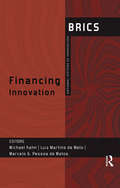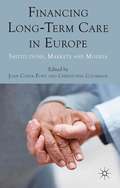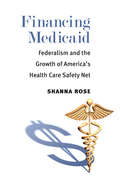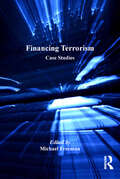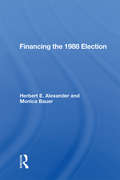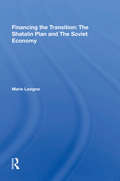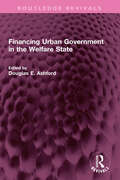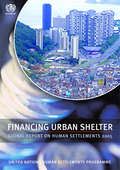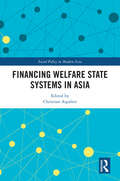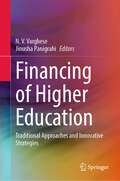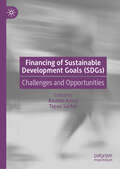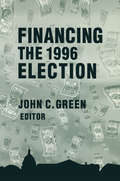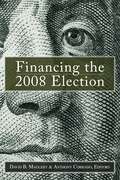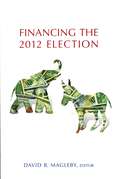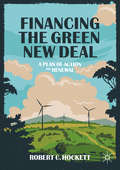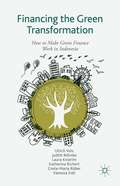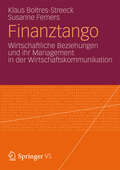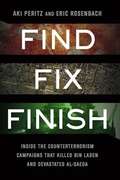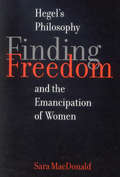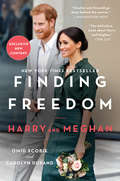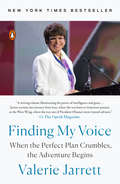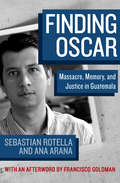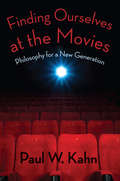- Table View
- List View
Financing Innovation: BRICS National Systems of Innovation
by Michael Kahn; Luiz Martins de Melo; Marcelo G. Pessoa de MatosThis series of books brings together results of an extensive research programme on aspects of the national systems of innovation in the five BRICS countries – Brazil, Russia, India, China, and South Africa. It provides a comprehensive and comparative examination of the challenges and opportunities faced by these dynamic and emerging economies. In discussing the impact of innovation with respect to economic, geopolitical, socio-cultural, institutional, and technological systems, it reveals the possibilities of new development paradigms for equitable and sustainable growth.This volume analyses the financing of science, technology and innovation in the BRICS economies. It highlights the importance of institutional coordination and the influence of implicit policies on the extent to which capital markets may contribute to innovation financing. It stresses the role of state development banks and similar organisations in promoting high-risk and long-run building of innovative capacities with respect to development strategy. Original and detailed data, together with expert analyses on wide-ranging issues, make this book an invaluable resource for researchers and scholars in economics, development studies and political science, in addition to policy-makers and development practitioners interested in the BRICS countries.
Financing Long-Term Care in Europe
by Joan Costa-Font Christophe CourbageThe ageing of the European population brings new financial risks that call for state, market and societal responses. In 2011, the first baby-boom generation is turning 65, and forecasts predict that the size of the old-age population in need of long-term care will double in the next 50 years in Europe. However, how different countries are responding to the challenge of financing long-term care is still a question open to further examination, including the role of market development, changing intergenerational contracts and especially the constraints of state intervention. Growing long-term care needs in several European countries as well as the reshaping of traditional modes of care-giving further increase the pressure for sustainable funding of more comprehensive long-term care systems. This book examines different forms of partnership and the potential cooperation of state, market and societal stakeholders. It not only offers a full understanding of the institutional responses and mechanisms in place for financing old age but also provides a deep analysis of both the demand and supply factors underpinning the development of financial instruments to cover long-term care needs in Europe. "
Financing Medicaid: Federalism and the Growth of America's Health Care Safety Net
by Shanna RoseConventional wisdom holds that programs for the poor are vulnerable to instability and retrenchment. Medicaid, however, has grown into the nation's largest intergovernmental grant program, accounting for nearly half of all federal funding to state and local governments. Medicaid's generous open-ended federal matching grants have given governors a powerful incentive to mobilize on behalf of its maintenance and expansion, using methods ranging from lobbying and negotiation to creative financing mechanisms and waivers to maximize federal financial assistance. Perceiving federal retrenchment efforts as a threat to states' finances, governors, through the powerful National Governors' Association, have repeatedly worked together in bipartisan fashion to defend the program against cutbacks. Financing Medicaidengagingly intertwines theory, historical narrative, and case studies, drawing on sources including archival materials from the National Governors' Association and gubernatorial and presidential libraries, Centers for Medicare and Medicaid Services data, the Congressional Record, and interviews.
Financing Terrorism: Case Studies
by Michael FreemanWithout money, terrorists cannot function as organizations and cannot conduct attacks. Yet the questions remain, how vulnerable are terrorists to financial disruptions? Can governments put pressure on their finances in meaningful ways or are they too resilient and adaptive to be affected by state actions? These and other questions about terrorism financing are vigorously debated by scholars and policymakers, particularly since the attacks of September 11th 2001 . While there is a growing literature on policy issues, strategies, and countermeasures, states must first understand their enemies before developing strategies to defeat them. So, instead of focusing on the state response, this book asks a more foundational question: How do different terrorist groups actually raise money? What are their budgets? What do their portfolios look like? How have they changed over time? What are the advantages and disadvantages of different sources of financing? The book includes case studies of 11 different terrorist groups or sets of groups within a country. It is clear that each group has a different portfolio tailored to their needs and their environment and this makes countering terrorist financing more challenging for the state. This topical book will be required reading for all students and scholars interested in terrorism financing as well as those working in government agencies tasked with combating terrorist groups and their financial resources.
Financing The 1988 Election
by Herbert E. AlexanderThis book describes the role money played in the campaigns of each of the major contenders for the 1988 presidential election and in congressional campaigns as well. It focuses on the aspects of the political process and contributes to our understanding of political influence in the United State.
Financing The Transition In The Ussr: The Shatalin Plan And The Soviet Union
by Marie LavigneThis book addresses the Soviet needs for external help to allow the Soviet leadership to carry out its program—in any version—of stabilization. It focuses on the scenarios outlined in the Shatalin plan, as elaborated in the 224-page draft made public.
Financing Urban Government in the Welfare State (Routledge Revivals)
by Douglas E. AshfordFirst Published in 1980, Financing Urban Government in the Welfare State shows how intergovernmental structures have now become the main policy device designed for an earlier age and often for quite different purposes, linking national and local policymaking. Special attention is given to the historical structures which now form the basis for national - local spending and investment decisions, and which moderate the increasing interdependence of national and local decisions. The so called ‘crisis’ of urban spending has not emerged as a major problem, but each country has sought to modify and adapt old bargaining procedures to the new needs and problems of local government. The manner in which this has been done reflects crucially important aspects of the political process in each country- Britain, France, the United States, Germany and the Netherlands, and does not follow the lines that might be suggested by economic deterministic thinking. Essentially each country must work out its historical and institutional compromise between the financial problems of national and local government, with politics continuing to have an important explanatory role in understanding contemporary urban development. This is an interesting read for scholars and researchers of urban studies, urban politics and public policy
Financing Urban Shelter: Global Report on Human Settlements 2005
by Un-Habitat'Achieving the goals set by world leaders in the United Nations Millennium Declaration will be difficult without a significant improvement in the lives of slum dwellers, and the lives of slum dwellers cannot be improved without the sound and sustainable economic development that is conducive to the establishment of a strong shelter sector. As Financing Urban Shelter: Global Report on Human Settlements 2005 emphasizes, one of the key challenges in meeting the Millennium Declaration Goal on slums is mobilization of the financial resources necessary for both slum upgrading and slum prevention by supplying new housing affordable to lower income groups on a large scale. . . . It is my hope that, by highlighting the impacts of current shelter financing systems on low-income households and by identifying the types of financing mechanisms that appear to have worked for them, this report will contribute to the efforts of the wide range of actors involved in improving the lives of slum dwellers, including governments at the central and local levels, as well as non-governmental and international organizations.' From the Foreword by KOFI ANNAN, Secretary-General, United Nations Financing Urban Shelter presents the first global assessment of housing finance systems, placing shelter and urban development challenges within the overall context of macroeconomic policies. The report describes and analyses housing finance conditions and trends in all regions of the world, including formal housing finance mechanisms, microfinance and community funding, highlighting their relevance to the upgrading of slums. Recent shelter finance policy development is discussed at the international and national levels, and the directions that could be taken to strengthen shelter finance systems are examined. The Global Report on Human Settlements is the most authoritative and up-to-date assessment of conditions and trends in the world's cities. It is an essential tool and reference for researchers, academics, public authorities and civil society organizations around the world. The preceding issues of the Global Report on Human Settlements have addressed such topics as An Urbanizing World, Cities in a Globalizing World and The Challenge of Slums. Published with UN-HABITAT
Financing Welfare State Systems in Asia (Social Policy in Modern Asia)
by Christian AspalterThis book identifies the main causes of welfare state system extension, as well as the differences in welfare state system design and their consequences for human behaviour and future financial stability of the systems in place in different parts of Asia. Providing ten in-depth country case-studies from across the region, including India, Thailand, China, Hong Kong, Macao, Taiwan, and South Korea, as well as Russia, Turkey and Saudi Arabia, the book focuses on the situation of welfare state system development and its financing in some of the largest countries on earth. It addresses previously neglected areas for investigation, such as the causal reasons for welfare state system extension (not only in Asia but in general), the types of social security systems and their incentive systems in place, and the way they chiefly determine behaviour—and thus determine the resulting social security needs. This book will be of interest to all scholars and students of social policy, public policy, political science, sociology, finance and economics, development studies and Asian studies more broadly.
Financing of Higher Education: Traditional Approaches and Innovative Strategies
by N. V. Varghese Jinusha PanigrahiThis book reviews and analyses higher education financing and explores the innovative ways by both public higher education and private higher education institutes in the context of globalization, with India, Russia and Tanzania as a case study. It examines the diverse policy discourses which greatly influence the higher education systems based on evidence-based research. This book is arranged into four major themes. Part 1 deals with the various possible modes of financing of higher education, such as the credit market and voucher system. Part 2 deals with strategies to mobilize the resources. Part 3 deals with innovative and sustainable approaches to financing private higher education institutions. Part 4 discusses the policies and limitations with external financing of higher education. It is an interesting collection of various themes in different chapters by serious researchers. It is an excellent read for students, educators and policymakers interested in alternative and innovative practices in higher education financing. It is a highly informative book for researchers providing insights on how social and political dynamics impact higher education financing.
Financing of Sustainable Development Goals (SDGs): Challenges and Opportunities
by Tapan Sarker Rashmi AroraThe economic and social impact of Covid-19 pandemic both on developing and developed countries has been significant. In addition to the impact of the pandemic, the current Ukraine war has also led to severe supply chain disruptions leading to a sharp increase in food and commodity prices globally. Due to a combination of external shocks and the impact of the pandemic, global economic growth slowed down and is projected to continue to decline. The above factors have led to a sharp increase in government expenditure constraining both developed and developing countries' fiscal capacity. This has further implications for the achievement of SDGs, especially for low-income countries. The challenge for developing countries in the current scenario is to mobilize adequate resources both from domestic and international sources, not just for the achievement of SDGs as such, but also to sustain the livelihoods, health, and welfare of people. This book aims to examine some of these issues in the context of developing countries.
Financing the 1996 Election
by John Clifford GreenFirst Published in 1999. Routledge is an imprint of Taylor & Francis, an Informa company.
Financing the 2008 Election: Assessing Reform
by Anthony Corrado David B. MaglebyThe 2008 elections were by any standard historic. The nation elected its first African American president, and the Republicans nominated their first female candidate for vice president. <P><P>More money was raised and spent on federal contests than in any election in U.S. history. Barack Obama raised a record-setting $745 million for his campaign and federal candidates, party committees, and interest groups also raised and spent record-setting amounts. Moreover, the way money was raised by some candidates and party committees has the potential to transform American politics for years to come.The latest installment in a series that dates back half a century, Financing the 2008 Election is the definitive analysis of how campaign finance and spending shaped the historic presidential and congressional races of 2008. It explains why these records were set and what it means for the future of U.S. politics. David Magleby and Anthony Corrado have assembled a team of experts who join them in exploring the financing of the 2008 presidential and congressional elections. They provide insights into the political parties and interest groups that made campaign finance history and summarize important legal and regulatory changes that affected these elections.Contributors: Allan Cigler (University of Kansas), Stephanie Perry Curtis (Brigham Young University), John C. Green (Bliss Institute at the University of Akron), Paul S. Herrnson (University of Maryland), Diana Kingsbury (Bliss Institute at the University of Akron), Thomas E. Mann (Brookings Institution).
Financing the 2012 Election
by David B. MaglebyThe amount of money flowing through U.S. politics continues to astound. "While not all expenditures are reported," writes David Magleby, "our best estimate is that at least $8 billion was spent in the 2012 federal elections." In this essential volume, the latest in a quadrennial series dating back to 1960, Magleby and his colleagues reveal where all this the money came from, where it went, what were the results--and why it matters.Anthony Corrado examines the most important changes and legal challenges to the law and regulation of campaign finance leading up to the 2012 election. John Green, Michael Koehler, and Ian Schwarber discuss the dynamics and funding of the Republicans' presidential nomination contest as well as the Obama campaign's activity--including the role his Priorities USA "Super PAC" played in negatively defining Romney.Candice Nelson examines in considerable detail how each side raised and spent its funds and the implications of their different approaches. Paul Herrnson, Kelly Patterson, and Stephanie Perry Curtis explore the financing of congressional elections. Diana Dwyre and Robin Kolodny examine the ways political parties raised and spent money through their national committees, including congressional campaign committees.Jay Goodliffe and Magleby examine how interest groups raised and spent money--closely examining the effect of the new Super PACs. How did these organizations raise more than $828 million, and how did they allot the $609 million they reported spending, and to what effect? Thomas Mann concludes with a summary of lessons recently learned regarding the financing of federal elections. What changes should be made to the system, and what institutional steps would they require?
Financing the 2012 Election
by David B. MaglebyThe amount of money flowing through U.S. politics continues to astound. "While not all expenditures are reported," writes David Magleby, "our best estimate is that at least $8 billion was spent in the 2012 federal elections." In this essential volume, the latest in a quadrennial series dating back to 1960, Magleby and his colleagues reveal where all this the money came from, where it went, what were the results-and why it matters.Anthony Corrado examines the most important changes and legal challenges to the law and regulation of campaign finance leading up to the 2012 election. John Green, Michael Koehler, and Ian Schwarber discuss the dynamics and funding of the Republicans' presidential nomination contest as well as the Obama campaign's activity-including the role his Priorities USA "Super PAC" played in negatively defining Romney.Candice Nelson examines in considerable detail how each side raised and spent its funds and the implications of their different approaches. Paul Herrnson, Kelly Patterson, and Stephanie Perry Curtis explore the financing of congressional elections. Diana Dwyre and Robin Kolodny examine the ways political parties raised and spent money through their national committees, including congressional campaign committees.Jay Goodliffe and Magleby examine how interest groups raised and spent money-closely examining the effect of the new Super PACs. How did these organizations raise more than $828 million, and how did they allot the $609 million they reported spending, and to what effect? Thomas Mann concludes with a summary of lessons recently learned regarding the financing of federal elections. What changes should be made to the system, and what institutional steps would they require?
Financing the Green New Deal: A Plan of Action and Renewal
by Robert C. HockettClimate scientists have determined that we must act now to prevent an irreversible and catastrophic climatic tipping point, beyond which neither our own nor many other species can be assumed likely to survive. On the way to that bleak ending, moreover, extreme socio-economic injustice and associated political breakdown—now well underway in nations already hard-hit by environmental crisis—can be expected to hasten as well. The time has thus come to plan carefully, thoroughly, and on a scale commensurate with the crisis we face. This book, written by one of the key architects of the Green New Deal and prefaced by Representative Alexandria Ocasio-Cortez's former Chief of Staff, indicates how to structure Green New Deal finance in a manner that advances the cross-cutting goals of maximum financial and economic inclusion, maximally democratic decision-making, and an appropriate division of roles both among all levels of government and among public and private sector decision-makers. Integrating into one complete and coherent financial architecture such bold ideas as a 'People's Fed,' an interdepartmental National Investment Council, integrated state and regional public banks, a Democratic Digital Dollar and digital Taxpayer Savings and Transaction Accounts made part of the monetary policy transmission belt, and an economy-wide Price Stabilization Fund, this book is critical reading for policymakers and citizens looking for a fresh path forward towards a revived and sustainable, progressive and productive America.
Financing the Green Transformation
by Ulrich Volz Judith Böhnke Vanessa Eidt Laura Knierim Katharina Richert Greta-Maria RoeberPlanetary boundaries and a scarcity of natural resources will require a significant boost of investment into clean and renewable energy and a more efficient use of resources in developing, emerging and advanced economies alike. In this context, the financial sector will have to play a key role in providing 'green finance' for sustainable investment and development. Against this backdrop, this book investigates the challenges for developing and emerging economies in enhancing green financingfor sustainable, low-carbon investment, using Indonesia as a case study. Based on surveys in the Indonesian banking and corporate sectors and expert interviews, the book devises innovative policy recommendations for governments to develop a framework conducive to fostering green investments.
Finanztango
by Klaus Boltres-Streeck Susanne FemersWirtschaftskommunikation ist eine vielfältige Managementaufgabe. Gegenstände der Steuerung sind zweifelsohne die Inhalte und Instrumente der Kommunikation. Management in der Wirtschaftskommunikation bedeutet aber mehr: Vielfältige Beziehungen der Akteure im Kommunikationsprozess sind von Kommunikationsmanagern aktiv und bewusst zu gestalten. Im "Finanztango" dieser Wirtschaftsbeziehungen sind daher für zielorientierte Kommunikation die Parkettbeschaffenheit zu prüfen, die gemeinsamen Schrittfolgen genau zu planen und mögliche Hindernisse abzuschätzen. Dieses Buch bündelt und systematisiert Wissen zum Beziehungsmanagement, damit die Pflicht nicht zur Bürde und die Kür ohne Abzug in der B-Note absolviert wird .
Find, Fix, Finish: Inside the Counterterrorism Campaigns that Killed bin Laden and Devastated Al Qaeda
by Aki Peritz Eric RosenbachTwo intelligence experts with unique access to inside sources reveal the fascinating story behind the evolution of AmericaOCOs new, effective approach to counterterrorism
Finding Freedom
by Sara MacdonaldCombining a detailed study of Hegel's political philosophy with close readings of two important literary works that help clarify his thought, MacDonald traces the historical development of an enduring link between personal lives and stable political communities. While Sophocles' Antigone highlights the tension in states that deny the interests of their citizens, MacDonald shows that Shakespeare's A Midsummer Night's Dream offers an alternative image, one that sees freedom for all as essential to an ethical family and state and is consistent with Hegel's thought in both the Phenomenology of Spirit and The Philosophy of Right.
Finding Freedom: Harry and Meghan and the Making of a Modern Royal Family
by Omid Scobie Carolyn DurandThe first, epic and true story of the Duke and Duchess of Sussex’s life together, finally revealing why they chose to pursue a more independent path and the reasons behind their unprecedented decision to step away from their royal lives, from two top royal reporters who have been behind the scenes since the couple first met. <P><P>Finding Freedom is complete with full color photographs from Harry and Meghan’s courtship, wedding, Archie’s milestones, and many more unforgettable moments. When news of the budding romance between a beloved English prince and an American actress broke, it captured the world’s attention and sparked an international media frenzy. But while the Duke and Duchess of Sussex have continued to make headlines—from their engagement, wedding, and birth of their son Archie to their unprecedented decision to step back from their royal lives—few know the true story of Harry and Meghan. <P><P>For the very first time, Finding Freedom goes beyond the headlines to reveal unknown details of Harry and Meghan’s life together, dispelling the many rumors and misconceptions that plague the couple on both sides of the pond. <P><P>As members of the select group of reporters that cover the British Royal Family and their engagements, Omid Scobie and Carolyn Durand have witnessed the young couple’s lives as few outsiders can. With unique access and written with the participation of those closest to the couple, Finding Freedom is an honest, up-close, and disarming portrait of a confident, influential, and forward-thinking couple who are unafraid to break with tradition, determined to create a new path away from the spotlight, and dedicated to building a humanitarian legacy that will make a profound difference in the world. <P><P><b>A New York Times Bestseller</b>
Finding My Voice: My Journey to the West Wing and the Path Forward
by Valerie Jarrett<P><P>"The ultimate Obama insider" (The New York Times) and longest-serving senior advisor in the Obama White House shares her journey as a daughter, mother, lawyer, business leader, public servant, and leader in government at a historic moment in American history. <P><P>When Valerie Jarrett interviewed a promising young lawyer named Michelle Robinson in July 1991 for a job in Chicago city government, neither knew that it was the first step on a path that would end in the White House. Jarrett soon became Michelle and Barack Obama's trusted personal adviser and family confidante; in the White House, she was known as the one who "got" him and helped him engage his public life. <P><P>Jarrett joined the White House team on January 20, 2009 and departed with the First Family on January 20, 2017, and she was in the room--in the Oval Office, on Air Force One, and everywhere else--when it all happened. No one has as intimate a view of the Obama Years, nor one that reaches back as many decades, as Jarrett shares in Finding My Voice. <P><P>Born in Iran (where her father, a doctor, sought a better job than he could find in segregated America), Jarrett grew up in Chicago in the 60s as racial and gender barriers were being challenged. <P><P>A single mother stagnating in corporate law, she found her voice in Harold Washington's historic administration, where she began a remarkable journey, ultimately becoming one of the most visible and influential African-American women of the twenty-first century. <P><P>From her work ensuring equality for women and girls, advancing civil rights, reforming our criminal justice system, and improving the lives of working families, to the real stories behind some of the most stirring moments of the Obama presidency, Jarrett shares her forthright, optimistic perspective on the importance of leadership and the responsibilities of citizenship in the twenty-first century, inspiring readers to lift their own voices. <P><b>A New York Times Bestseller</b>
Finding Oneself in the Other
by G. A. CohenThis is the second of three volumes of posthumously collected writings of G. A. Cohen, who was one of the leading, and most progressive, figures in contemporary political philosophy. This volume brings together some of Cohen's most personal philosophical and nonphilosophical essays, many of them previously unpublished. Rich in first-person narration, insight, and humor, these pieces vividly demonstrate why Thomas Nagel described Cohen as a "wonderful raconteur.? The nonphilosophical highlight of the book is Cohen's remarkable account of his first trip to India, which includes unforgettable vignettes of encounters with strangers and reflections on poverty and begging. Other biographical pieces include his valedictory lecture at Oxford, in which he describes his philosophical development and offers his impressions of other philosophers, and "Isaiah's Marx, and Mine," a tribute to his mentor Isaiah Berlin. Other essays address such topics as the truth in "small-c conservatism," who can and can't condemn terrorists, and the essence of bullshit. A recurring theme is finding completion in relation to the world of other human beings. Engaging, perceptive, and empathetic, these writings reveal a more personal side of one of the most influential philosophers of our time.
Finding Oscar: Massacre, Memory, and Justice in Guatemala
by Sebastian Rotella Ana Arana Brian Reed Habiba Nosheen Francisco GoldmanThe harrowing and heartrending story of Guatemala’s Dos Erres massacre, and the survivors whose lives were forever changed by it In 1982, at the height of Guatemala’s civil war, twenty soldiers from the army’s commando unit, called the Kaibiles, invaded the farming village of Dos Erres. Masquerading as leftist guerillas, the squad members cut their way through the small town, killing more than 250 men, women, and children. Only a handful of people survived. One of them, a young boy, was adopted by Kaibil lieutenant Ramírez and raised by Ramírez’s family, who named him Oscar. Just three years old at the time of the massacre, Oscar grew up unaware of his true origins. It wasn’t until almost thirty years later, living in the suburbs of Boston with a family of his own, that Oscar would learn the truth. Drawn from interviews with massacre survivors, commandos-turned-protected witnesses, lawyers, and forensic anthropologists, Finding Oscar is a powerful, groundbreaking investigation into the Dos Erres massacre and its aftermath. It is an unforgettable account of the secret abductions of Dos Erres survivors, the mission to bring the perpetrators to justice, and the courage of the Guatemalan people. This ebook contains content not available anywhere else. Additional features include: A preface by Sebastian Rotella An afterword by acclaimed author Francisco GoldmanOscar’s story is also featured on the May 25, 2012, episode of This American Life, available for download at www.thisamericanlife.org. A slide show, timeline, and details about how this story was reported can be found at www.propublica.org.
Finding Ourselves at the Movies
by Paul W. KahnAcademic philosophy may have lost its audience, but the traditional subjects of philosophy -- love, death, justice, knowledge, and faith -- remain as compelling as ever. To reach a new generation, Paul W. Kahn argues philosophy must be brought to bear on contemporary discourse surrounding these primal concerns, and he shows how this can be achieved through a turn to popular film.In such well-known movies as Forrest Gump (1994), The American President (1995), The Matrix (1999), Memento (2000), The History of Violence (2005), Gran Torino (2008), The Dark Knight (2008), The Road (2009), and Avatar (2009), Kahn explores powerful archetypes and their hold on us, and he treats our present-day anxieties over justice, love, and faith as signs these traditional imaginative structures have failed. His inquiry proceeds in two parts. First, he uses film to explore the nature of action and interpretation, and narrative, not abstraction, emerges as the critical concept for understanding both. Second, he explores the narratives of politics, family, and faith as they appear in popular films. Engaging with genres as diverse as romantic comedies, slasher films, and pornography, Kahn gains access to the social imaginary, through which we create and maintain a meaningful world.
